Tag: Small Business
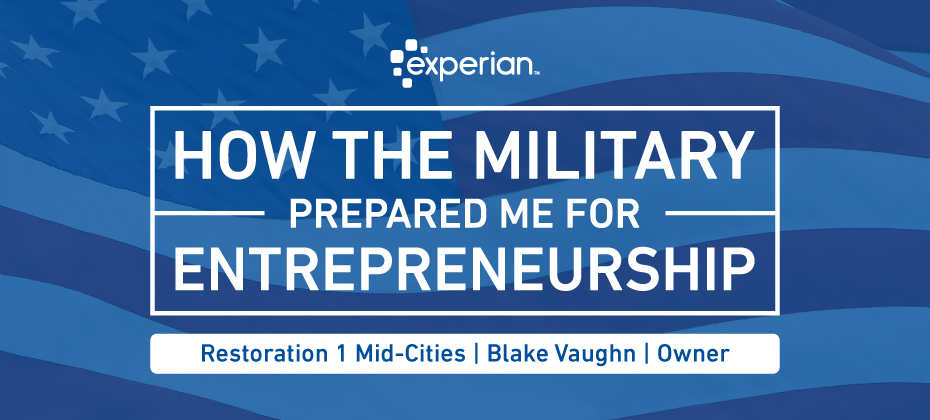
Experian Business Information Services has been honoring Veteran Entrepreneurs in the month of May on the Small Business Matters blog featuring a series of posts highlighting military veterans who went into business for themselves. We asked them about making the transition from military to small business, what challenges they faced, and how their career in the service prepared them to run their own small businesses. A common thread among the veteran entrepreneurs we’ve interviewed for this series is family. They came from a military family, they built a family with those who work in their business, or they left active duty to spend more time with their family. To these veterans, it is an honor and duty to serve their country. They show the same commitment and respect to those closest to them. With a family legacy of military service, entrepreneurship and a “passion to serve”, this veteran honors his heritage by sharing his story, starting with his father’s choice to join the Army. In his late teens, Blake Vaughn’s father was involved in a deadly bar fight. When he was given the choice to go to prison or join the Army, he chose to serve. He left the military early to take care of his ailing parents, and, after his parents died, he took in his siblings as well. He soon started his own family and worked for the post office before going into business for himself. In 26 years, he grew his business from nothing into a multi-million-dollar company. Between the 2001 recession and a divorce, the family suffered multiple setbacks, including foreclosure on their home. After the divorce, Blake, still, a teenager, decided he needed to do something to help lift his family out of poverty and help his mother put food on the table. He decided to follow in the footsteps of his father, grandfather, uncles, and brother and join the military. What did you like most about serving in the U.S. Military? “Serving my country and building strong relationships with people. On a personal level, it’s fulfilling to know you’re participating in something greater than yourself. I feel weird and undeserving when someone says, “thank you for serving.” I think of my brother… his vehicle was destroyed by an IED. Thankfully, nobody got hurt. I don’t like to compare the two of us but at the same time, I at least participated in the security of the country. I’ve always had a huge love for our history, values, the Constitution and our country. My wife homeschools our son and part of that is history… so from the perspective of serving in the military, sharing that with my son is cool. The most enjoyable part is the people and the camaraderie. I was a junior officer, so I learned the leadership that comes with that. I’m a big fan of leadership and personal development. As a leader, people don’t care how much you know until they know how much you care. I am more interested in getting to know people first and building relationships and letting them shine. By doing that, I had some excellent relationships with those guys I led. I still have great relationships with them.” What inspired you to make the transition to entrepreneurship? “My father was a veteran and entrepreneur. He was given the choice to go to prison or go to the army after a bar fight. He chose to serve and straightened up his life. He got out and worked for a little while until he decided to start his own business. He built a $12 million business and then lost it after 20+ years. I wanted to serve just as my father, grandfather, several uncles, and brother did as well, but I also wanted to pursue entrepreneurship because I saw the satisfaction that comes from creating something for your family.” Blake worked through college earning his MBA in marketing while waiting to go into the military. Due to delays in his selection process and a government sequester, it took many years before Blake was finally able to attend officer candidate school in the Navy. He served as a gunnery/ordnance officer on the USS CHAFEE in Hawaii before exiting with an honorable discharge into the reserves. In that time, he also married his college sweetheart, whose first husband had passed away and left her with a 1-year-old son. Between his time working through college and after leaving the military, he “bounced around to all areas of business”, working various customer service, finance and hospitality jobs before finally taking the entrepreneurship leap. Tell us about your business. “We started our first business, a restoration franchise in August 2016, handling water and fire damage. Our second business, Patriot Services Construction, started in May of 2017. In our first calendar year, we generated $1.1 million in gross revenue. For our 2nd full year, we hope to close over $2M. We’re also adding roofing to our services.” Blake’s business can be found online here: Restore NTX LLC & Patriot Services LLC What skills from your military career do you apply most often to your business? “Administrative, risk assessment and management, program management, leadership, motivation, inspection, and accountability. It (the military) was extremely grueling work. Only about 2% is cool. The other 98% is mundane repetitive tasks. It can tear you down, so you have to keep focused and motivated to do what’s necessary because if the country calls on you, you have to be ready. I find fulfillment from motivating people and that allowed me to press harder and stay focused. It was a great learning experience for me.” Did you access Government programs to launch your business such as SBA loans? “Yes, we did get an SBA 7A loan for $110K when we first started. We combined that with personal funds and I took on a partner when we started - a guy I know from church named Jeff Lott. We both wanted financial freedom and control of our time. We partnered together to buy vehicles and equipment to launch our business. There’s a book called Rocket Fuel that talks about the combination of visionaries and integrators when building a business. The book is good. I’m a visionary. I look for new revenue sources and he’s the integrator. We compliment each other in business. We’ve found a really good spot. It’s been an excellent partnership.” What is the biggest challenge about being an entrepreneur? “Facing the unknown and taking risks that could cost us greatly. I took away from the military, and my time during training especially, that you’re used to having pleasures in life, being comfortable, and they strip that away… 6 months living out of a backpack. You learn perseverance. You don’t need a lot to live. It allows you to lay it all on the line when you do have challenges. Entrepreneurs, when failure looks like it could happen, they begin to backtrack. Several people I know went back to their corporate jobs. You have to define what is essential and get rid of everything else that doesn’t take you closer to what’s important to you. It’s a challenge… “what if we fail”. Jeff and I didn’t have experience. In our industry, people typically use a direct sales force to get off the ground, build relationships with trade partners to refer work. We tried that and it didn’t get off the ground. Instead of getting scared, we looked into internet marketing instead. We shifted heavily into internet marketing. We have no salespeople whatsoever and 90% of our business now comes from internet marketing. Creating the right mindset is most important, and being willing to take a risk is part of that. As Grant Cordone says, “Commit first and figure it out later.” We also try to automate our business as best we can, taking advice from Tim Ferris’ 4 Hour Work Week. What is the greatest reward in being an entrepreneur? “Our technicians do hard work and their mindset is serving people, not just making money. It was nice to volunteer a short time in Houston after Hurricane Harvey and tracking through the disaster to help with recovery. We didn’t need to be directed. We knew what to do so we just got to work helping those folks. There’s also satisfaction in creating something important and it’s nice to have more freedom to enjoy life.”
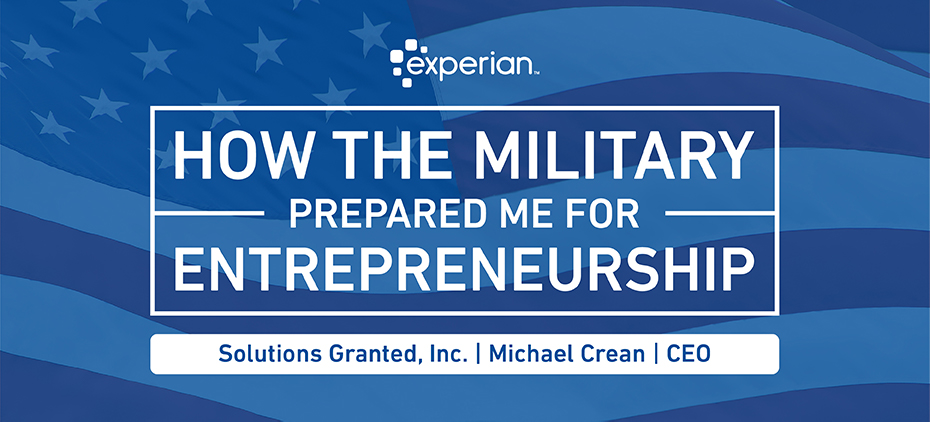
For the month of May, as we head into Memorial Day, the Small Business Matters blog will feature a series of posts highlighting military veterans who went into business for themselves. We’ll ask them about making the transition from military to small business, what challenges they faced, and how their career in the service prepared them to run their own small businesses. Throughout this interview series, it’s become obvious that veteran entrepreneurs, or vetrepreneurs, seem to possess a few similar traits. Whether these veterans were born with these qualities, they were instilled during childhood or they honed them during their active duty service is still to be determined. Veteran entrepreneurs are resourceful leaders and seem to readily adapt to life as a business owner. An Army veteran who recognized his entrepreneurial spirit in high school and needed a job after transitioning from the military, shares his self-described, “dumb luck” story with us. Micheal Crean’s first taste of owning a business was in junior high school. He would buy Little Debbie snacks and sell them to his friends. His parents worked for 30 years in a GM factory, doing the same job every day, something Crean described as “monotonous”, with no complaints. They took their children on family vacations and allowed them to play whatever sport they dreamed. He looked up to them, their persistence and tenacity to do whatever it took to take care of their family. After spending 9 years in military – 4 years at Ft. Bragg’s 82nd Airborne Division on special assignment – Crean felt tired of not being home for his own family. He would go on a 15-month deployment, leaving his wife and baby and come home to a “walking, talking child”. He imagined, after seeing the globe and many different points of view, that he’d do something with his life. He ended up doing something he never imagined. “I had to make a decision of what was more important to me.” What did you like most about serving in the U.S. Military? “The ability to work on a global level protecting those who could not protect themselves.” What inspired you to make the transition to entrepreneurship? “If it wasn’t for kids, I wouldn’t have been out of the Army. I served and now I wanted to be a dad. It’s kind of a story of dumb luck and needing a job. I interviewed with a company who hires veterans in the DC area. They asked me if I knew anything about computers. I knew I could learn anything I put my mind to… but I also get bored really easily. The government contracting world puts you in a box and you do that job for as long as that contract goes on. This was around 1999. I decided to step out into commercial space. I was valuable because of my leadership qualities. I found myself trying to stay in front of the dot com failure wave. It caught up with me. I was mad and disappointed in myself because I’d given up a military career and now I was on unemployment. A general contracting company offered me a job to tear things down. At the same time, a good friend who worked at collection agency asked me to come build computers and network for them. Another person who was a VC said their full time IT guy left and asked me if I would do it part time. I would do whatever it took to feed my family. My friend at the VC company was doing textile cleaning for high end homes and the White House. Someone wanted me to help build a network. That was around 2001 and it just went on from there. “ Michael Crean started Solutions Granted in 2001 in response to the need for information technology and information security, or cybersecurity, expertise. As someone who fell into the business, he credits his adaptability and resilience with keeping his business going, even through the recession. Solutions Granted helps businesses in many markets and government entities with IT security but also develops new solutions as needed in the ever-changing digital landscape. What skills from your military career do you apply most often in your business? “Logical thinking, crisis management, effective leadership… The things I did in the military - not having running water or eating a meal that comes from a brown plastic bag – taught me to get creative. As a business owner, that really lets me know what’s important in life. I don’t take things that seriously because I know what the military goes through. In my business, what we’re doing is important but no one’s going to die today. The military gave perspective. And adaptability! The military taught me that! How to adapt and overcome in the face of adversity. Entrepreneurs need to have this too. Our business model has changed a couple times through necessity.” Did you access Government programs to launch your business such as SBA loans? “No. No small business loans. No mentors for me. The only idea I had on how to run a business was, to be honest, honorable, ethical, and offer a good service. We’re self-funded. We never needed business loans. We did use lines of credit to do what we do. Maybe my business would be different if I did that. We’ve been reinvesting in our company along the way. Hiring and growing at a measured pace. I learned the lesson, ‘take care of your soldiers.’ We take care of our employees. One of the largest expenses is healthcare. I pay 100% of my employee’s benefits – and for an employee who’s been with us over 10 years, for his wife and kids too.” What is the greatest reward in being an entrepreneur? “Being around to affect my employees' lives and watching their families grow and prosper. The military taught me, ‘it’s our own free will to say yes’. When you set out to start your own business you must remember that you chose this. It wasn’t forced on you, you chose this. I have three grown daughters and two younger children at home. My oldest daughter started working for me after she graduated college. She runs accounts receivable, order management and accounts payable. I get to recreate time with my daughter, time I lost during deployments. I’m almost 18 years into this. One employee has been with me for 10 years, since age 18. How does life get any better? When I joined the military, I wanted to make a difference. I wanted to leave something for my children, protect those freedoms and enjoy being a kid. I can continue to do this because cybersecurity is such a danger to businesses out there. I guess I’ve traded one battlefield for another.” Is there anything else you’d like to share? “Be passionate about something and be good at what you do. Stop worrying about what’s happening around you to others. When a door opens, don’t be afraid to walk in. The unknown could be the greatest level of success you could not have predicted.”
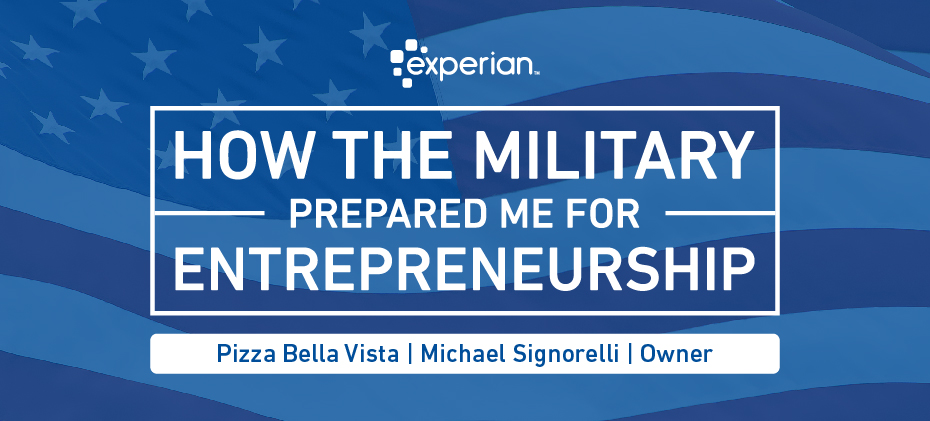
For the month of May, as we head into Memorial Day, the Small Business Matters blog will feature a series of posts highlighting military veterans who went into business for themselves. We’ll ask them about making the transition from military to small business, what challenges they faced, and how their career in the service prepared them to run their own small businesses. Many veterans are attracted to military service because of world travel and learning opportunities. With permanent changes of station (PCS) and the responsibility of mobilization at a moment’s notice, active duty veterans will likely have visited several other countries before retiring or transitioning from the military. On these assignments, troops will find themselves in unfamiliar territory, unable to speak the language and often surrounded by people and cultures they do not understand. One such veteran immersed himself in the culture of his station in a foreign country and came back to the States inspired to build a business. Raised near Niagara Falls in an Italian/Polish community, Michael Signorelli grew up around good food and already considered himself a “foodie”. When he joined the Navy, he was offered an assignment working with NATO in Naples, Italy for 3 years. He imagined he would be enjoying a glorified version of the food he grew up eating. He realized immediately that “true Italian food from the motherland is wildly different from Italian American food”. For 14 years, Signorelli worked in administration, finance and personnel in the Navy. For his last 10 years, he was commissioned as a Limited Duty Officer. These assignments instilled business organizational skills and taught him how to train and lead people, skills that would be necessary for his future business. He’s currently running a successful Neapolitan pizza restaurant in Virginia. What did you like the most about being in the military? “I cherished every single tour of duty because I was able to learn something in every place I went and every job I had. Most of it was good. My approach was to learn something from everyone. Naples was my best tour. Who knew that tour would develop what I would do post-retirement? It would have been something along the lines of Italian food but if it wasn’t for Naples, I wouldn’t have even tried it. My second best tour was Djibouti, Africa. Our goal was to win the hearts and minds of the people to keep Somali warlords from setting up terrorist camps. I saw people struggle and build houses out of rocks - stacked them like you’ve never seen them stacked before…. Because of that time, I don’t like to waste things. It was rewarding and when I think I’m having a bad day or my kids or employees think something is challenging, I bring those moments up as teaching moments. If you don’t have the opportunity to see that, you’d never know. I worked with remarkable people that influenced me and made me a better leader and groomed me to be an entrepreneur. It gave me the tools, the exposure and diversity of the jobs. The Navy prepared me in a way that Harvard Business school couldn’t have. I loved every minute of it. I still interact with people in the Navy. We work hard but the payback is in experience. You can’t always be compensated in money.” What inspired you to make the transition to entrepreneurship? “Pizza making is a respected craft in Italy. It’s ingrained in their life, runs in their veins. When you show interest, they want to share their story. In Naples, even through the language barrier, I learned ‘survival Italian’ so I could learn everything I could about Neapolitan food and pizza. My lifelong dream was always to open a restaurant. I went through the rest of my Navy career always looking for that pizza. We ended up getting stationed near Buffalo, NY. We missed it so much we tried to get back to Italy, but we couldn’t, so we took a tour in Sardinia. I learned more about that unadulterated island where farmers and winemakers work into their 60s and 70s…. it’s just amazing. Back in states, we couldn’t find Neapolitan pizza unless we were going to New York City. I decided I’d one day open a Neapolitan pizzeria.” Tell us more about your business. “We decided, after I ended up in VA (after 14 years in the navy), we’d build a wood-fired oven in our backyard. We started cooking pizzas for ourselves, entertaining neighbors and friends. It was great practice. When we started thinking about retirement from the Navy, about 3 years before, I discovered a company in Colorado who was building wood-fired ovens on trailers – like a food truck - built to last for 10 years. For our $19,000 investment, we could test the market in Virginia to see if Neapolitan pizza would take off. We started doing small catering gigs and the popularity soared. We were requested to do corporate events, big weddings, local city events in the park… The craziness started but we still had full time jobs. My wife was permanent substitute teacher and I was still in the Navy. Evenings and weekends were spent doing these mobile events. It was a great platform and great training. We tested the market and got out of it what we wanted. Then it was time to hang it up in the Navy and enter this restaurant idea. It wasn’t easy to graduate this idea, but we weren’t exposed to Mother Nature anymore. Wind messes up tents or temperatures can ruin a party, but when you’re committed to a private event, you do it. Working in a restaurant was easier but it was a big learning curve. We worked our butts off and plowed to that goal. Now it’s 3 years later. We got rid of the mobile oven - we wanted to keep it but we sold it because the restaurant was keeping us so busy.” Michael and his wife opened Bella Vista Pizzeria in September 2015. What is the greatest thing about being a small business owner? “That dream I had to start a restaurant? I get to walk in that door every day and see it and touch it and live it and there’s nothing more special than that for me. And to be able to give back. I support special programs here locally. It’s great to be in a position to be able to live off of something you created and be able to help people in a small way, like delivering pizzas, one of the most favorite foods in America, on National Pizza Day to a food bank. So rewarding. “ What is the hardest thing about being a small business owner? “In the military, we’re constantly faced with ‘you gotta do more with less’ and ‘get the job done’ mentality. And you usually do get the job done. Then you start your own business and suddenly… remember what I did in the Navy? My job was to be somewhat organized and now I’m having to order food and track inventory. The mobile business was easy for me to track everything and now I’m doing pest control, dishwashing, ordering food from different sources, wine, beer, payroll, and suddenly I was completely disorganized. I woke up one day, 3 months behind in reconciling, leading up to doing my taxes, and I’m in there doing business and making pizzas. I had to learn that I couldn’t do everything. I had to leave some things to the professionals. I freed my time up by paying a fee for an accounting service and payroll service and that lifted an incredible burden on me and allowed me to focus on training of staff and execution of day-to-day operations. I suddenly couldn’t do everything. I was, for the first time in my life, overwhelmed. Of course, my wife helped but we were both overwhelmed. We really loved it, and we were good at it. We had to learn to get good at other stuff or get help with it.” Did you tap any Government programs to help launch your business? “No but I tried to. I banked forever with Navy Federal. I didn’t pursue any venture capitalist or loan programs. I went to the bank I’d went to for years. I first asked for $80,000 to help. They looked at my business plan and they told me no, they’re not a business-centric financial institution. They rejected the $80,000 but favorably endorsed me for a government small business loan with the SBA. SBA came back a month later and said they were unable to back a ‘mom and pop’ restaurant because the rate of failure is too high. So, my loan officer at Navy Federal went back to the folks in D.C and got me a $35,000 loan, which was helpful. I funded a majority of the business out of savings.” Could more be done to help Veterans go into business for themselves? “There are a lot of programs out there – I’ve looked at some – but there’s a lot of bureaucracy. Sometimes it could be made so hard. For me, when I got rejected by the largest government-backed organization, I felt like the smaller programs wouldn’t help.” For fun, can you tell us what makes Neapolitan pizza different? “Did you know that Neapolitan pizza just won Unesco’s Cultural Gift to Humanity? The Vera Pizza Napoletana Association governs that Neapolitan pizza is always done the right way with only fresh ingredients, a certain type of flour, a specific type of tomatoes and cooked in a 900-degree oven for 90 seconds. The crust is charred and the toppings soupy. It’s like no other pizza you’ve ever tasted and it’s not a pizza you can take to go. If you’re ever in Virginia, stop by and give us a try!” Watch Bella Vista's Small Business Story, courtesy of Navy Federal Credit Union

In this post, Experian takes a closer look at specific challenges women business owners face gaining access to capital for their business.

With the Tax Cuts and Jobs Act of 2017 making dramatic changes in new tax law, business owners should be asking themselves how to plan for the future.

Consumers are being urged to monitor and lock or freeze their credit profile, but how should small business owners respond? Will a freeze impact a business?
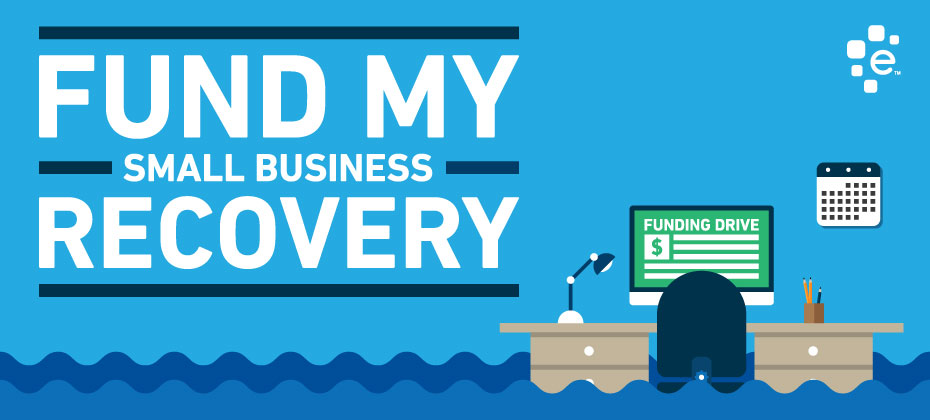
In the aftermath of Hurricanes Harvey and Irma, news outlets reported the FEMA statistic that 40% of small businesses never recover after a disaster. With 74% of small businesses closed after Hurricane Sandy, a 2015 Nationwide Insurance survey stated that 75% of small businesses still don't have a disaster plan in place. For overwhelmed small business owners, the possibility of a natural disaster may be a low priority compared to keeping customers happy and the bills paid. When an unfortunate and unplanned disaster strikes, they have to be creative when putting their lives and their businesses back in order. Savvy business owners who prepare in advance can usually mitigate potential damage to their business by being prepared and activating their business continuity plan. Small Business Disaster Planning With natural disasters, from hurricanes, flooding, tornadoes, earthquakes, or wildfires, there is a potential loss of: Office premises including equipment, supplies, furniture, and more. Records, paper or digital, that are necessary to keep the business running. Any goods or supplies needed to sell goods or services to customers. Employees' homes and the likelihood of their return to work. Suppliers or distributors who are unable to reach your place of business. Customers who may do business elsewhere if they are unable to reach your business. Office equipment and the like can be replaced eventually, but company and accounting records cannot. The U.S. Small Business Administration has created a Record Keeping for Small Business Guide to assist with the necessary records, such as contracts, licenses, leases, personnel information, and accounting records, for rebuilding your business. FEMA (Federal Emergency Management Agency) also has a Small Business Preparedness website for disaster planning. Helpful tips include storing records in the cloud, creating a threat analysis, purchasing business insurance, and the development of a continuity plan to include communication with employees, vendors and suppliers. The goal is to get back online as soon as possible so the loss of customers is minimal. Filling the gap Many business owners are finding out that their business insurance will only cover so much, and there is a significant gap between what is paid out in claims and what is needed. So many are forced to think up creative solutions to getting their businesses back online by borrowing from friends, family and investors. Entrepreneurs familiar with innovative financing options of startup capital are beginning to turn to relying on crowdfunding when disasters occur. Crowdfunding for Small Business Recovery Crowdfunding is a familiar source of capital to entrepreneurs with new or growing businesses. Many entrepreneurs relied on sites such as Kickstarter or Indiegogo to raise funds and a potential audience for their service or product. The 2017 University of Chicago Alternative Finance Benchmarking Report found that while equity-based crowdfunding decreased 7% last year, "Donation-based Crowdfunding grew by 60%, generating $224 million in 2016." The same report noted that over the past 3 years, donation-based crowdfunding has increased by 40%. This is good news to entrepreneurs who are also using crowdfunding to help raise funds after an unexpected natural disaster. Ashley Freeman, with Handy Ma'am home improvement services in Houston, TX, relied on Go Fund Me to help with her recovery in the aftermath of Hurricane Harvey. Ashley ran a campaign to replace tools and supplies that were damaged in the storm. Her goal was met but she's still recovering, "Go Fund Me was a great head start to getting back to where I need to be," says Ashley. "I'm so thankful for knowing so many people care as much as I do when other people are in need." Kiva, a non-profit organization dedicated to raising funds for entrepreneurs in 80 countries, is another crowdfunding platform being used by those affected by the September 2017 hurricanes. Jonny Price, a senior director with Kiva U.S., is proud of the work they're doing to support small businesses. "At Kiva, our aspiration is to leverage the generosity of our 1.6 million global lenders to expand financial access for entrepreneurs deemed too risky or expensive to serve by conventional lenders. Supporting small businesses hit by natural disasters like Hurricanes Harvey, Irma and Maria is one powerful and relevant example of how we hope to meet that aspiration. This loan to Matilsha in Puerto Rico was funded recently by 358 Kiva lenders. We hope that, through long-term reconstruction efforts, Kiva's sustainable lending model can complement the heroic work of more donation-based first responders like the Red Cross." Recovery Doesn't Have to be a Disaster 2017's hurricanes and wildfires have unfortunately put business owners on task to prepare for a worst-case scenario. FEMA and the U.S. Small Business Administration have created online guides for helping small businesses recover, and will also help financially through low interest loans. While businesses and residents await their turn in securing financing for rebuilding, more entrepreneurs and business owners are turning to alternative sources of financing to get back to the business of serving customers.
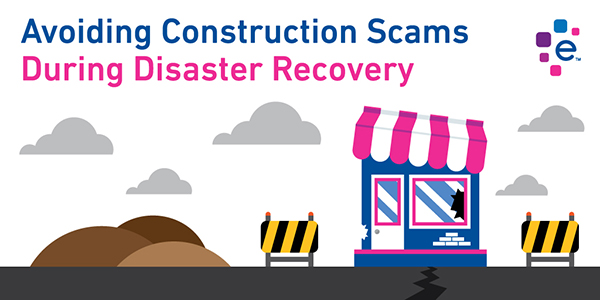
When a small business is damaged by a natural disaster — be it a hurricane, flood, earthquake or tornado — recovery presents its own set of hazards. There is, of course, the immediate cost of lost business. There are both short- and long-term physical dangers posed by weakened walls and ceilings, exposed power cables and mold. And then there are the threats posed by skilled disaster recovery scam artists who see small business owners as easy prey. Kenneth Citarella, CFE, knows all about these post-disaster scams. A former New York state prosecutor, Citarella now works for Guidepost Solutions LLC, which provides investigations, compliance, monitoring, and security and technology consulting solutions for clients in a wide range of industries. In the wake of Super Storm Sandy, which devastated large sections of coastal New Jersey, Brooklyn and Staten Island in 2012, Citarella served as a Guidepost Solutions “Integrity Monitor,” making sure contractors were in fact performing the work for which they were being paid. “The days and weeks following a natural disaster are times of great stress and confusion,” Citarella said. “This is the perfect breeding ground for scams of all kinds. Small business owners need to be aware of how they may be targeted and how to avoid being a victim.” How Fraudsters Find Their Marks While natural disasters are horrific events, they’re great for contractors and restoration companies for whom such events are their bread and butter. As soon as a disaster occurs, it’s not unusual for construction companies to descend on the affected site, blanketing the area with pamphlets and brochures, and stuffing mailboxes with business cards. While many contractors are legitimate, there can be a good number of storm chasers who are just out to make a fast buck. At a time when construction labor is at historic lows, small business owners may find themselves working with a firm with less than stellar credentials “The more enterprising scam artists will take the time to go door-to-door, offering low-ball prices or even offering to cut the business owner in on the fraud,” Citarella said. “For example, they’ll offer to do the $75,000 worth of restoration work that is actually required, bill the business owner’s insurance company for $100,000, and then split the difference. This is an obvious solicitation of fraud and should be reported immediately to the local police.” Common Types of Post-Recovery Fraud In addition to the insurance scam described above, Citarella discussed other forms of fraud a small business owner might encounter following a major disaster. “The most common type of recovery fraud involves a contractor who shows up to do the first two or three days’ worth of work, and then just disappears. Another type involves the use of lower-grade or otherwise substandard materials,” Citarella said. Citarella also noted that otherwise well-meaning contractors may buckle under the pressure a natural disaster creates, leaving the business owner out thousands of dollars and still unable to operate. “A small contractor can easily get in over his head,” Citarella stated. “He may not be able to get enough workers, have problems with his supply line, or be managing too many projects at once. There may be no criminal intent here, but the outcome is the same.” How to Avoid Contractor Fraud Find reliable, licensed contractors and validate their businesses before hiring them to help you rebuild. Experian’s ContractorCheck.com/Hurricane is being offered as a free resource to those affected during this time of recovery. This website enables you to find contractors and easily check the critical components of a contractor’s business background, including license, bond and insurance data (if an when available from state licensing boards). Click here to see a sample report. Also, the Better Business Bureau (BBB) offers a list of recommendations to business owners and anyone else looking to hire a construction contractor, among their recommendations: 1. Ask for Recommendations. Ask friends, relatives and fellow business owners to recommend contractors they have previously hired. 2. Check Their Track Record. Use bbb.org or other business review websites to get customer reviews, complaints and any notices of criminal violations. 3. Verify the Business License. Make sure the contractor under review has a valid license to do business in your state. 4. Get Multiple Quotes. Always get at least three quotes for any particular job. Any quote that is unusually low is probably one to avoid. Remember the old adage, “If something seems too good to be true, it probably is.” 5. Look for Signs of “Professionalism.” A reputable contractor will arrive in a vehicle that is clearly marked and branded, and may wear a uniform bearing his/her company name. 6. Request References. Ask the contractor for a list of previous customers you can contact and discuss their satisfaction with the contractor’s service. 7. Check Professional Affiliations. Ask if the contractor belongs to any trade organizations. Such companies are usually bound to operate according to a strict code of ethics. 8. Avoid Large Up-Front Payments. Pay by check or credit card for added protection. Avoid paying in cash. 9. Get Everything in Writing. Demand a written contract, and make sure to read it carefully, especially the fine print. Make sure the contract includes the contractor’s name, street address, telephone number, email address and state license number. Fill in any blank spaces. Don’t sign anything you don’t understand. “Document every step of the reconstruction progress,” Citarella added. “Take pictures every day to record the contractor’s progress. Smartphone pictures can be invaluable in the event of contractor misbehavior or if there is a challenge by your insurance carrier.” Citarella described four “gears” that run any reconstruction machine. “There’s the business owner, the adjuster, the carrier and the contractor. All four need to work together to get a job done right. However, the only one who has a stake in effective cooperation is the business owner. So if you have a business that needs post-disaster repair, take the time to make sure it’s done right.” If you are in the process of rebuilding following Hurricane Harvey or Irma and need to check the contractor you are working with, go to www.contractorcheck.com/hurricane to receive up to 15 free reports. Also, Sam Fenerstock of Credit Manager’s Association published an excellent article titled “How To Assist Your Customers To Stay In Business After Natural Disaster“, it contains lots of great information about disaster preparedness and working with your customers if they are impacted by a natural disaster.
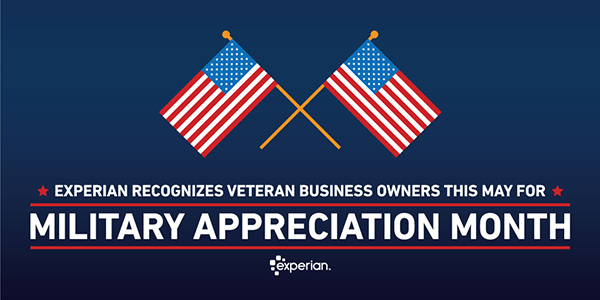
The United States military is the one organization that has produced more business owners than any other institution. After World War II, a stunning 49 percent of veterans went on to start their own business. Veterans are a diverse, multi-talented, innovative group of leaders who deserve our respect and gratitude. The Small Business Administration (SBA) wanted to study the impact of veteran-owned businesses on the U.S. economy, and the results of this study have just been released in a new report titled Veteran-Owned Businesses and Their Owners: Data from the U.S. Census Bureau's Survey of Business Owners. Per the SBA's Office of Advocacy, there are 2.52 million businesses majority-owned by veterans. The report, compiled from 2012 Census data also states that veteran-owned firms represent a staggering $1.4 trillion in revenue, employing over 5 million people. Veterans represent a diverse cross-section of businesses in just about every industry. And it seems the training and skills these veterans learn while enlisted are a key to their success when they enter the private sector. John Lee Dumas Take John Lee Dumas, founder and host of the award-winning podcast Entrepreneur on Fire. Dumas credits his rapid success in the world of podcasting to his time in the U.S. Army as an armor platoon leader. After serving 13 months on active duty in Iraq and an additional four years in the reserves, Dumas worked in Real Estate briefly, and passed time while driving listening to podcasts. He noticed most podcasters released shows on a weekly basis, and saw an unfilled need for a daily show geared toward Entrepreneurs. Dumas now hosts one of the most successful business podcasts online. Veterans are also at the heart of our growing business economy. Recently Forbes profiled the top 25 veteran-founded startups in America, which included companies such as: Plated.com, founded by Nick Taranto, US Marine Corps, Infantry. Plated delivers everything needed to cook a chef-designed healthy, affordable, and delicious dinner at home in around 30 minutes. RallyPoint.com, founded by Yinon Weiss, U.S. Army, Special Forces; Aaron Kletzing, U.S. Army, Field Artillery Officer; and Dave Gowel, U.S. Army, Armor Officer. RallyPoint is an online network of more than one million current and former members of the U.S. military where they gather to discuss military life, share information, and exchange stories. Because having strong credit is an essential component of running a successful business, Experian would like to do our part in helping veterans continue to achieve success. In honor of Military Appreciation Month, veterans can receive: 50% off annual monitoring of business credit, or 20% off single reports It’s our way of saying thank you to our hometown heroes – not only for your service to this country, but also for your continued hard work towards keeping our economy thriving.
